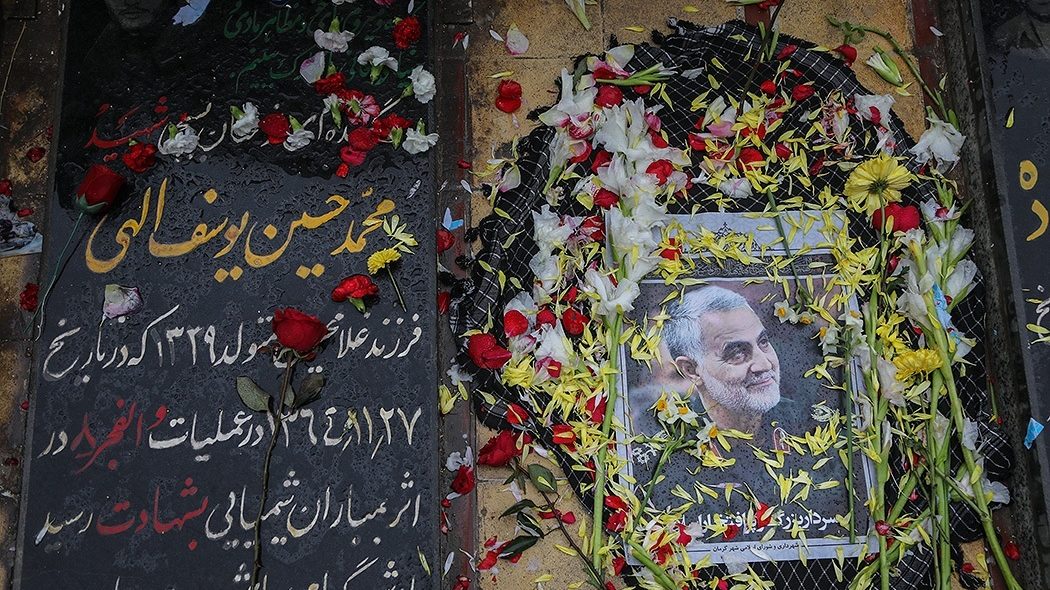Looking at the Soleimani Assassination, One Year Later
One year ago, two US MQ-9 Reaper drones fired Hellfire missiles that killed Iran’s Maj. Gen. Qasem Soleimani. This brazen assassination at the international airport in Baghdad also resulted in the deaths of the deputy head of Iraq’s Popular Mobilization Units and eight others. President Donald Trump boasted that he took care of “two for the price of one” and he spent the majority of 2020 on the campaign trail pointing to the killing of the “sadistic mass murderer” as a major foreign policy success.
Many supporters of Trump’s “maximum pressure” campaign claim that the assassination of Soleimani established US deterrence over Iran. However, a number of facts undermine this argument. Last month, the Trump Administration along with Israel deployed aircraft carriers, B-52 bombers, submarines and other military assets to the Gulf to “deter Iranian attacks on US troops.” On December 23, Trump tweeted that “if one American is killed [in Iraq], I will hold Iran responsible.” It’s worth asking, why is such a huge movement of US military assets to the region necessary to deter Iran if the Soleimani killing achieved that objective? Furthermore, over the past 12 months, Iran has engaged in activities that it would not have done, had Trump’s foreign policy effectively established any real deterrence over Tehran.
On January 8, 2020, only five days after Soleimani’s killing, the Iranians hit two military bases that housed American troops in Iraq with ballistic missiles. The Islamic Revolutionary Guard Corps said this move, which resulted in no deaths, was a “partial retaliation.” Then, on March 11, 2020, 18 rockets struck Iraq’s Camp Taji base, located north of Baghdad, killing two US service members and one Brit, and wounding roughly 12 others. On April 15, 2020, the Islamic Revolutionary Guard Corps Navy made a “dangerous and provocative” move by sending 11 of its vessels very close to US Navy and Coast Guard ships in international waters. On June 18, 2020, Iranian-backed Iraqi militias fired rockets that struck the Green Zone in Baghdad, marking the fifth such attack within 10 days.
Iran also has benefited from ways in which Soleimani’s killing impacted Iraq’s political environment. With many Iraqi lawmakers not wanting any potential intensification of US-Iran brinkmanship to spiral out of control on their country’s soil, they have pressured Washington into reducing the US military presence in Iraq. Threats from US Secretary of State Mike Pompeo to close the US Embassy in Iraq if officials in Baghdad do not stop Iran-sponsored groups from waging more attacks against the compound mean that Tehran could gain even greater clout in Iraq if the US takes this step. This move “would place US diplomats out of harm’s way but could jeopardize years of efforts to both stabilize the Iraqi government and keep it from becoming too dependent on neighboring Iran,” according to The New York Times.
Biden and the Impact of Soleimani’s Killing
The Trump administration’s decision to assassinate Soleimani will have an impact that plays out in the Middle East and in US-Iran relations far into the post-Trump period. There is no denying that the killing’s illegality will undermine Washington’s ability to use international law as a means of holding Tehran accountable for Iran’s “malign” activities in the future.
How much success President-elect Joe Biden’s administration will have in terms of engaging the Islamic Republic diplomatically remains to be seen. That the US killed Soleimani in early 2020 will make it more difficult for the US to reach a partial thaw in Washington-Tehran relations. “The assassination of Soleimani makes the prospect of further negotiations on issues outside of the nuclear case, especially issues related to Iran’s national defense, more complicated,” explained Dr. Assal Rad, a senior research fellow at the National Iranian American Council. “Biden will have a tougher time establishing trust, and Iranian hardliners who are against detente with the US will use the killing as a reason against returning to the deal,” he said.
Ultimately, after Biden enters the Oval Office later this month, his foreign policy team will have to quickly address the hostility in Washington-Tehran relations. The incoming administration must cope with the lasting impact of Soleimani’s assassination and other toxic policies pursued by Trump which brought hostilities in US-Iran relations to a dangerously high level.
Time is not on the side of the former vice president. Trump’s successor will have a relatively short period of time to make progress on this front because Iranian elections in June could usher in a new administration in Tehran that is far less open to the idea of engaging Washington diplomatically. As Rad put it: “How Biden handles diplomacy with Iran in the early months of his administration will likely set the stage for how things go.”
This year, 2021, could prove to be one of the most important years in US-Iran relations. The relationship could move in a variety of directions. There is a real opportunity for the Biden Administration to bring back to diplomacy in US foreign policy vis-à-vis the Islamic Republic. It would behoove officials in Washington and other capitals to realize that diplomacy is the only viable path to lowering temperatures with Iran and restricting the country’s nuclear program.



